Liberal Democrats: Who is leader Sir Ed Davey?
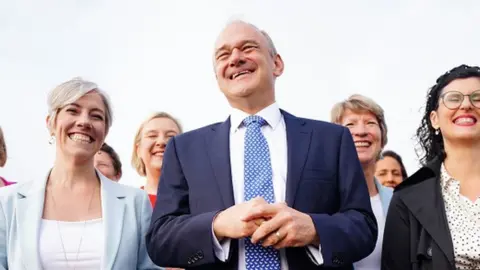 PA Media
PA MediaLiberal Democrat leader Sir Ed Davey has delivered his keynote address activists at his party conference in Bournemouth.
He was elected to the role in August 2020 - back then the Liberal Democrats were recovering from the 2019 general election when their fiercely anti-Brexit stance failed to translate into electoral success.
The party's fortunes have revived somewhat since then.
They have won several by-elections, gaining four new MPs and overturning a few huge Conservative majorities in the process, although they are still stuck on around 10% in national opinion polls.
Sir Ed was a cabinet minister, serving as energy and climate change secretary in the Conservative/Lib Dem coalition government. He has also received an award for a life-saving act of heroism - and Ed Balls used to copy his homework.
So who is the leader of Britain's fourth biggest political party?
Born in Nottinghamshire, to solicitor John and teacher Nina, Sir Ed has described his childhood as happy and stable.
However, he was only four when his father died and still in his teens when his mother was diagnosed with a terminal illness.
The task of caring for their sick mother largely fell to the young Ed and his elder brother. She died when he was 15.
Speaking to the Nick Robinson Political Thinking podcast, he said that losing both parents at a young age made him "quite independent".
"I remember after my mum died that summer going back to our house by myself and thinking about studying - previously I had studied to make my mum happy, now I had to make that decision for myself," he said.
The young Ed attended Nottingham High School, which he described as a "public school with a lot of Tory bias but also a lot of free thinking and people reading the Guardian".
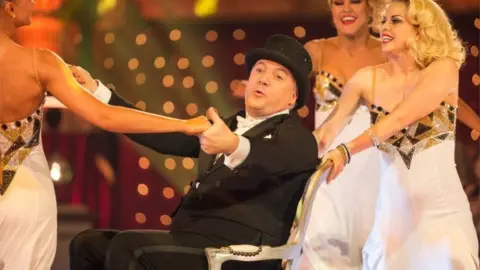
The Lib Dem leader is not the first politician among the school's alumni. Conservative minister Ken Clarke also attended the school as well as Labour ministers Geoff Hoon and Ed Balls.
"I lent him my O-level history notes," said Sir Ed of the Strictly Come Dancing star, adding: "He never gave them back."
'Seeing Green'
Although interested in ideas as a teenager, he didn't commit to a political party.
His elder brother Charles took him to his first political event - a Young Conservatives disco - which he says "put me off for life".
Having been heavily influenced by Johnathon Porritt's book on the ecology of politics Seeing Green, Sir Ed looked at joining the Green Party but concluded they were "too authoritarian and left wing".
Six months after graduating from Oxford University with a first class degree in Politics, Philosophy and Economics, he went to work as economics researcher to the Liberal Democrats, led at the time by Paddy Ashdown.
However his career could have taken a very different path. At around the same time MI6 tried to recruit him.
Asked by the BBC's Victoria Derbyshire why he turned it down, he replied that "working for Paddy was pretty exciting - you never knew what you he was going to do next".
Despite rejecting the chance to be the next James Bond, he was still capable of heroic acts. In 1994 he received awards from the Royal Humane Society and the British Transport Police after rescuing a woman from the path of an oncoming train at Clapham Junction.
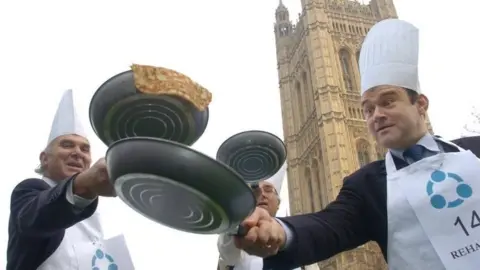 PA Media
PA MediaActing as an economic adviser, he continued working for the Liberal Democrats until 1993, when he left to join consultancy firm Omega Partners.
However he soon returned to Parliament after winning the then Conservative seat of Kingston and Surbiton in the 1997 election.
As a Liberal Democrat he may not have imagined he would one day end up in a position of power, but when Nick Clegg took his party into coalition with David Cameron's Conservatives he became a junior minister in the business department.
And in 2012 he replaced Chris Huhne as energy and environment secretary. Mr Huhne had resigned after being charged with perverting the course of justice over a speeding case.
Recalling his time in government, Sir Ed said there was "an amazing sense that the things you had dreamed of, you could actually implement... it was so exciting".
He also admitted to feeling frustration and said he learnt to develop "sharp elbows".
In a list of his "proudest" achievements at the energy department, Sir Ed includes increasing the UK's use of renewable electricity, securing EU-wide climate change targets and making switching suppliers easier.
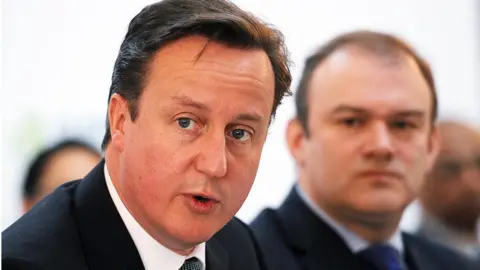 Getty Images
Getty ImagesHis time in government didn't last and in the 2015 election he, along with 48 other Liberal Democrat MPs, lost his seat as voters gave the party a pummelling.
But two years later he returned to Parliament, retaking his Kingston and Surbiton seat.
Following that election, Lib Dem leader Tim Farron resigned and Sir Ed considered running to replace him.
However he chose not to, citing his family as the reason.
He had married fellow Lib Dem Emily Gasson in 2005 and the pair had two young children, a daughter Ellie and a son John who could neither walk nor talk due to an undiagnosed neurological condition.
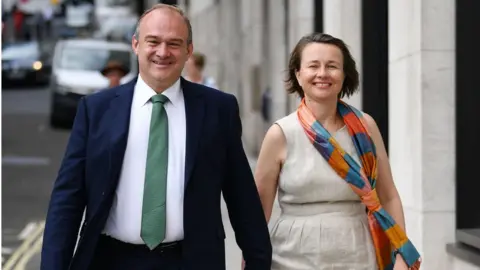 Getty Images
Getty ImagesThe Lib Dem leader describes his son as "adorable" and "great fun" but acknowledges that caring for him is "extraordinarily challenging".
"It certainly shaped my views and helped me understand disability a lot more," he has said.
Two years on, he felt able to enter the leadership contest - this time to replace outgoing leader Sir Vince Cable.
He lost that race to Jo Swinson, but six months later she was out and he took the reins as acting co-leader of the party.
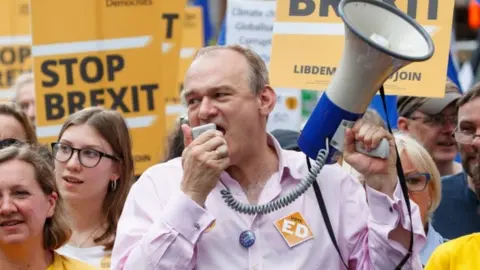 AFP
AFPDuring his leadership campaign Sir Ed has said the party needs to move away from campaigning on Brexit, telling the Guardian: "People need to understand what a party is about. And you can't define a party by an issue which will go, which is transitional."
He has focused the party's campaigning firepower on unseating Conservative MPs in the South of England at next year's general election.
Some in his party want him to be more bold about their belief in rejoining the EU. He has said such a policy is currently "off the table" and voters are not talking about Brexit.
Instead, he has concentrated on attacking the Conservative government over the NHS, education and sewage dumping in rivers - issues he believes will hit home with the party's target voters.
He has ruled out another coalition with the Conservatives after a general election - but hasn't ruled out some kind of deal with Labour in the event of a hung Parliament, although it would be unlikely to be a full coalition.
